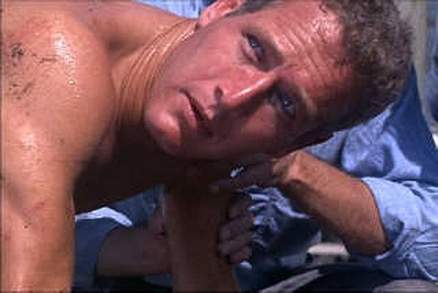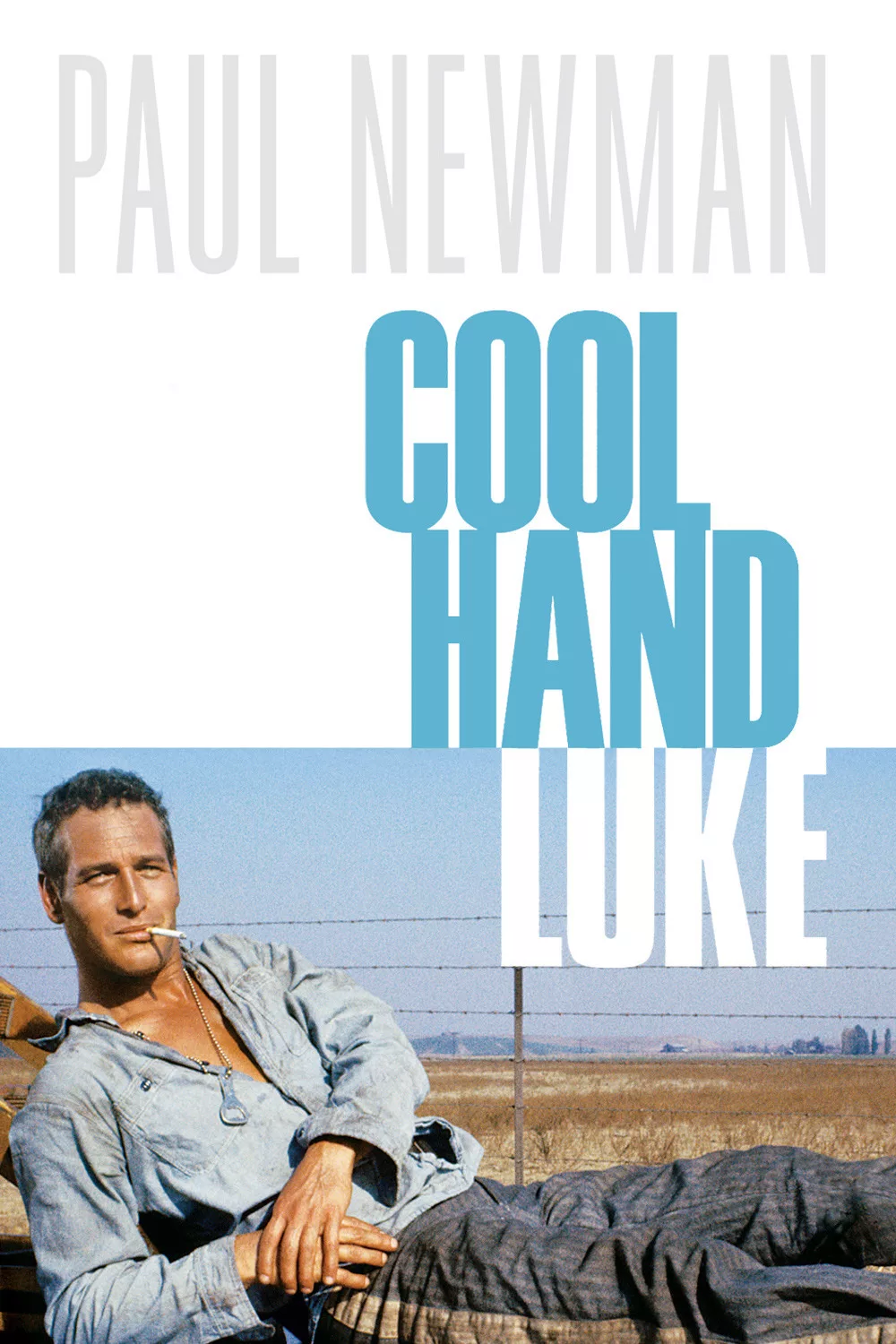[EDITOR’S NOTE: This review contains spoilers.]
A key moment in the development of the movie anti-hero came right at the end of “The Wild One,” when Marlon Brando gave out with that slow, sickeningly sweet smile. For the first time, here was a leading character who didn’t give a damn what you thought of him.
There had been anti-heroes in the movies before, but they were really heroes in disguise. The audience identified with them even though they were on the wrong side of the law, were unwashed, had rotten luck, were physically repugnant or were just plain bad guys.
But in the early 1950s, a new breed of anti-hero started to develop. He didn’t want your sympathy or understanding. In fact, he despised social workers, and audiences who thought like social workers. Brando’s belly-scratchng, under-shirted Stanley Kowalski in “A Streetcar Named Desire” was a leading character like that. And then, two years later in 1954, Brando made “The Wild One” and Hollywood had invested a new kind of film.
In a few movies every year, the central character seemed to be rejecting the values of the audience and stomping on its sympathy. Not all the roles went as far as Brando’s motorcycle hoodlum. But Rod Steiger’s “Pawnbroker” was a pretty tough case, and James Dean’s entire career descended directly from Brando’s early style. Lee Marvin and Steve McQueen have made several apiece. Anthony Quinn is practically a professional unwashed anti-hero, although “Zorba” was an old-style lovable rebel. And then you have the case of Paul Newman.
Newman used to be just another good-looking movie star. But he went through a gradual shift in image, starting with “Exodus,” and finally he was convincing enough that you didn’t snicker when he shouted “Follow me, men” and went over the top. The ability to pull off a line like that is important, and the actors who can do it last forever, like John Wayne and Richard Widmark.
But then Newman did something else. He could have gone the Charlton Heston route, getting more noble in every picture until finally he was heroic enough to paint the ceiling of the Sistine Chapel, drive chariots, part the Red Sea and take dictation from God.
But he hasn’t been making that kind of movie. Instead, he’s been in movies where he is a fairly ordinary guy in a fairly ordinary situation. He’s more or less like the people he hangs around with, except he won’t be pushed. He knows his own mind.
The bad guys in his movies don’t like that, and so they try to break him. And he fights back, no matter how much it hurts. If the characters he has played stopped there, they would be more or less conventional heroes. But they don’t. Although they exhibit heroic stubbornness and integrity, they’re not very likable.
For on thing, they’re loners. For another, they don’t seem to have basic human feelings. They do rotten things and don’t fell bad. They’re cold and aloof, and their enemies are usually fairly average people, with a sense of humor. People just like us. We’d break a guy like Paul Newman if we had the chance, because he’s a troublemaker, a malcontent, a loner. Won’t have a drink with the boys. Doesn’t give to the United Fund. That’s the kind of guy he played in all those movies, beginning with H (“The Hustler,” “Hud,” “Harper,” “Hombre“). He smiled at the idiots who were crossing him. He didn’t care what people thought. And a subtle change took place: The hero stopped wanting to be a hero.
In “The Hustler,” Newman played Eddie Felson, a pool expert in love with his own image as a champion. Jackie Gleason, as Minnesota Fats, was the guy the audience identified with because they didn’t like Newman’s attitude. In the end, Fast Eddie got his thumbs broken, and audiences weren’t all that sorry. Yet Newman was the central character of the movie, the “hero.”
In “Hud,” once again, Newman was the outsider. He didn’t share his father’s sentiment for the ranch and the cattle, and although his little brother idolized him, Newman did all he could to disillusion the kid and discourage his admiration. “Harper” was a more-or-less similar character, a private detective in the Bogart mold but even less open than Sam Spade, to ordinary human contact.
Then, in the recent “Hombre” the Newman character gained a degree of self-understanding. Newman played a white man who had been raised by Indians and adopted their way of life. He becomes joined to a party of travelers who are all incapable of protecting themselves and coping with the Western badlands. So Newman is the hero, the guy who can handle things and defend the weak. Only he doesn’t want to. He despises the travelers and sees no need to endanger his own life to save theirs. They talk about courage and duty, and he says he doesn’t know what the words mean. In the end, he does sacrifice himself to save a member of the party, but he doesn’t feel good about it. His death just proves the uselessness of being a hero. Where will it get you?
Now in his latest film, “Cool Hand Luke,” Newman brings this character to the end of its logical development, playing a hero who becomes an anti-hero because he despises the slobs who worship him. Luke is on a Southern chain gang. He’s the only prisoner with guts enough to talk back to the bosses and the only one with nerve enough to escape.
He begins the movie as a likable enough guy, always smiling, always ready for a little fun. He eats 50 hard-boiled eggs on a bet and collects all the money in the camp. That Luke, he’s a cool hand.
His biggest admirer is a slack-jawed hillbilly named Dragline (admirably played by George Kennedy, the cop who never got the swinging gate fixed in “In the Heat of the Night”). Dragline figures as long as Luke keeps escaping it’s almost as good as escaping yourself. Once when Luke escapes he mails the boys a photo of himself with a couple of beautiful girls, and when, he’s returned to the camp, he can’t convince them the photo was faked.
At about this point, the fun of being a hero begins to pale. When Luke is returned to the camp after each escape, he is driven to the brink of madness and death by whippings, solitary confinements, work details and more refined tortures.
After one punishment session, Luke pleads for mercy from the boss. The boys on the chain gang are stunned; how could good old Luke ever break down and surrender? Their vicarious hero has failed them and now they are left with nothing but their own cowardice.
When Luke finally does escape for the last time, he isn’t smiling so much. The whole hero business has become fatal, and this time he is escaping for himself, not his buddies. Dragline gets sucked into coming along, to his own surprise and Luke’s weary resignation, and there is a scene at the end in which the hero turns in his mantle and allows Dragline to see him as he is: A desperate, discouraged man who despises his admirers and will no longer pay the price necessary to entertain them.
The movie hero used to be an inspiration, but recently he has become a substitute. We no longer want to be heroes ourselves, but we want to know that heroes are on the job in case we ever need one. This has resulted in an interesting flip-flop of stereotypes.
Used to be the anti-hero was a bad guy we secretly liked. Then, with Brando, we got a bad guy we didn’t like. An now, in “Cool Hand Luke,” we get a good guy who becomes a bad guy because he doesn’t like us.
Luke is the first Newman character to understand himself well enough to tell us to shove off. He’s through risking his neck to make us happy. With this film, Newman completes a cycle of five films over six years, and together they have something to say about the current status of heroism. Whether this was anyone’s original intention is doubtful. But “Cool Hand Luke” does draw together threads from the earlier movies, especially “Hombre,” and it is a tough, honest film with backbone.




















